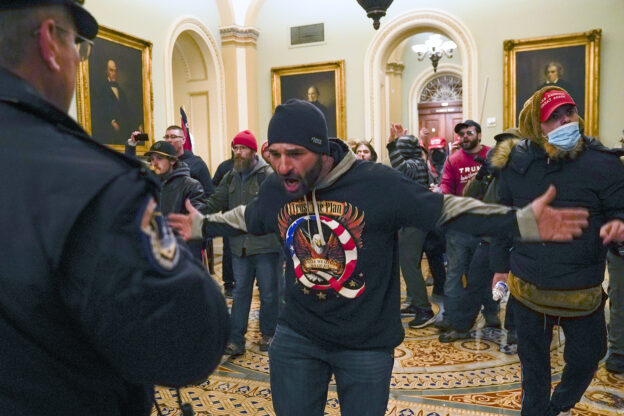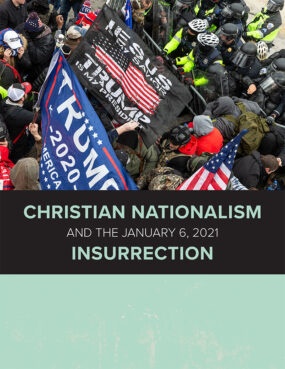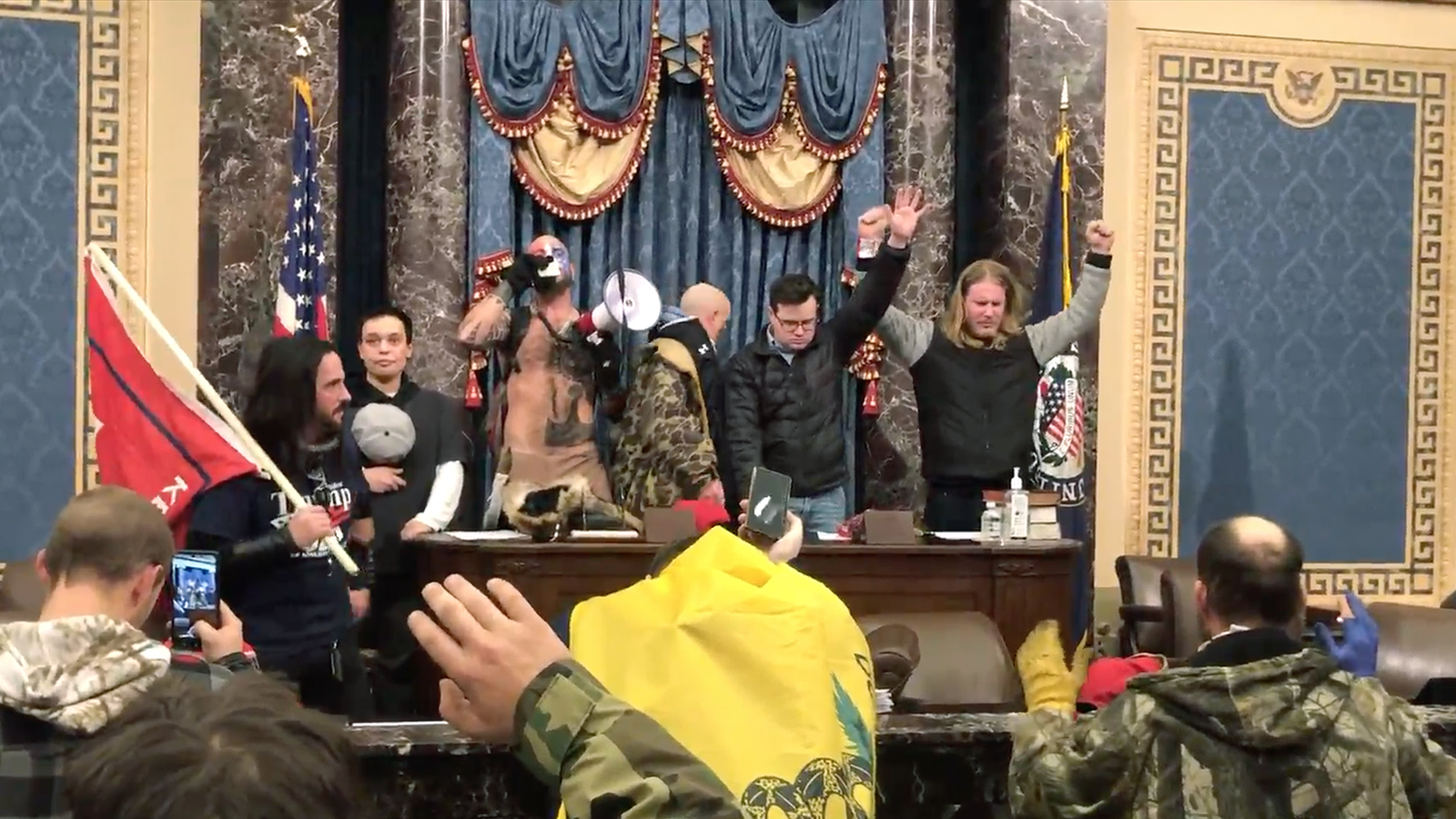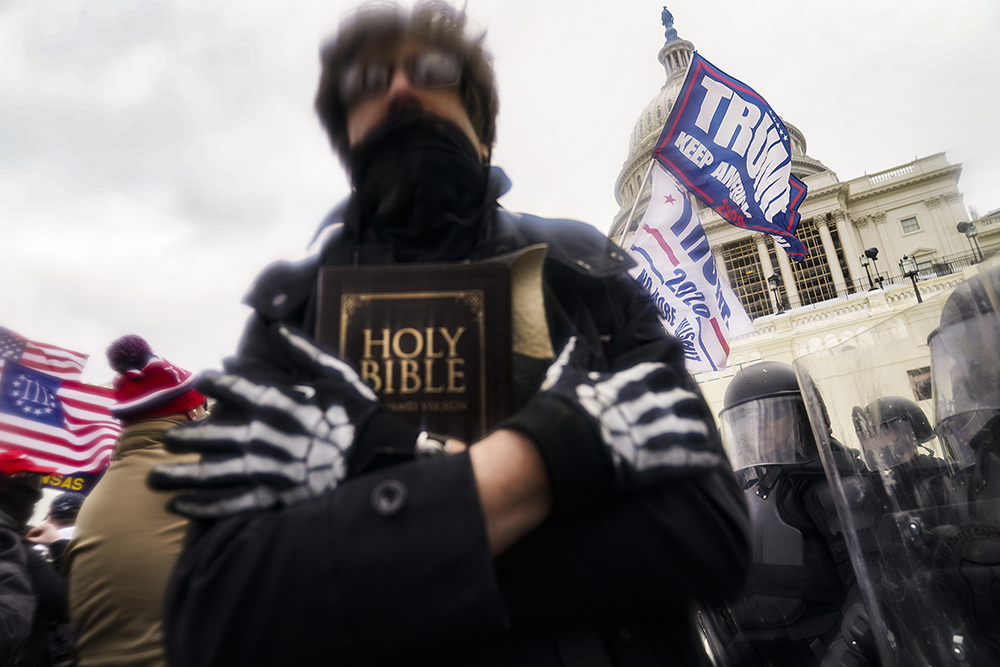
(RNS) — A team of scholars, faith leaders and advocates unveiled an exhaustive new report Wednesday (Feb. 9) that documents in painstaking detail the role Christian nationalism played in the Jan. 6 attack on the U.S. Capitol and calling it an unsettling preview of things to come.
Christian nationalism was used to “bolster, justify and intensify the January 6 attack on the Capitol,” said Amanda Tyler, head of the Baptist Joint Committee for Religious Liberty, which sponsored the report along with the Freedom From Religion Foundation. Tyler’s group is behind an initiative called Christians Against Christian Nationalism.
The organizations touted the report as “the most comprehensive account to date of Christian nationalism and its role in the January 6 insurrection,” compiled using “videos, statements, and images from the attack and its precursor events.”
RELATED: How the Capitol attacks helped spread Christian nationalism in the extreme right
The report, written chiefly by Andrew L. Seidel, an author and director of strategic response at the Freedom From Religion Foundation, details Christian nationalist rhetoric and symbols that cropped up at events that preceded the insurrection, such as the Million MAGA March and Jericho Marches that took place in Washington in Dec. 2020 and Jan. 2021.

Cover of the “Christian Nationalism and the January 6, 2021 Insurrection” report. Courtesy image
Christian nationalist symbols and references, Seidel writes, were ubiquitous at those gatherings, as well as the insurrection itself: flags with superimposed American flags over Christian symbols; “An Appeal to Heaven” banners; prayers recited by members of the extremist group Proud Boys shortly before the attack or by others as they stormed the Capitol.
Speaking to reporters on Wednesday, Seidel highlighted what he called the preponderance of “openly militant” rhetoric that conflated religion and violence. He pointed to William McCall Calhoun Jr., a Georgia lawyer who reportedly claimed on social media that he was among those who “kicked in Nancy Pelosi’s office door” on Jan. 6. (Calhoun later claimed in an interview with the Atlanta Journal Constitution that he did not personally enter any office.)
“God is on Trump’s side. God is not on the Democrats’ side,” Calhoun allegedly wrote in a social media post. “And if patriots have to kill 60 million of these communists, it is God’s will. Think ethnic cleansing but it’s anti-communist cleansing.”
In the report, Seidel recounts a conversation with New Yorker journalist Luke Mogelson, who recorded widely shared footage of insurrectionists attacking the U.S. Capitol and praying in the Senate chamber.
RELATED: For insurrectionists, a violent faith brewed from nationalism, conspiracies and Jesus
“The Christianity was one of the surprises to me in covering this stuff, and it has been hugely underestimated,” Mogelson told Seidel. “That Christian nationalism you talk about is the driving force and also the unifying force of these disparate players. It’s really Christianity that ties it all together.”
The more than 60-page study also features a series of reflections from scholars such as Andrew Whitehead, an associate sociology professor at Indiana University–Purdue University Indianapolis and co-author, with Samuel L. Perry, of “Taking America Back for God: Christian Nationalism in the United States.”
On Wednesday, Whitehead described Christian nationalism as a “cultural framework” bolstered by “mutually reinforcing” elements that spurred the violence at the Capitol, such as the QAnon movement and the erroneous belief that the 2020 presidential election was stolen from Donald Trump.

A group of insurrectionists prays inside the U.S. Senate chamber after breaching the Capitol, Jan. 6, 2021, in Washington. Video screen grab via Luke Mogelson/The New Yorker
He was echoed by Perry, an associate professor of sociology at the University of Oklahoma. Citing data drawn from their book and additional surveys conducted over the past year, Perry argued Christian nationalism not only fueled the Capitol attack but also is being used by some to radically reinterpret the Jan. 6 attack in ways that obscure fact or even valorize participants.
Christian nationalism is a “powerful motivator for future violence,” Perry said.
Other contributors to the report include journalist Katherine Stewart, author of “The Power Worshippers: Inside the Dangerous Rise of Religious Nationalism.” At Wednesday’s press conference, she argued that the Capitol attack is an expression of a broader, complex Christian nationalist network that trumpets a right-wing agenda.
“Christian nationalism is, first and foremost, a political movement,” said Stewart, arguing that Christian nationalist leaders are primarily concerned with power.
Anthea Butler, chair of the department of religious studies at the University of Pennsylvania and author of “White Evangelical Racism: The Politics of Morality in America,” was one of several authors to single out white Christian nationalism, a more specific term that highlights, among other things, the role of white supremacy within the modern movement as well as its historical precursors.
“Slavery in America enabled white Christian nationalism by asserting that enslaved Africans were not human — in part by using scriptural justifications to support it,” Butler wrote.
Another author of the report, Jemar Tisby, a historian and head of Black Christian collective The Witness, differentiated white Christian nationalism from popular forms of patriotism among Black Americans that often stress concepts such as racial equality and voting rights.

In this Jan. 6, 2021, file photo, a man holds a Bible as Trump supporters gather outside the Capitol in Washington. The Christian imagery and rhetoric on view during the Capitol insurrection are sparking renewed debate about the societal effects of melding Christian faith with an exclusionary breed of nationalism. (AP Photo/John Minchillo)
Speaking at the press conference, Tisby said Black Christians have “understood their faith as motivating them toward a multiracial democracy,” a viewpoint that has undergirded decades of activism.
Asked about the future of Christian nationalism — particularly its growing popularity among right-wing extremists — the authors struck a somber tone.
RELATED: Christian leaders condemn Christian nationalism in new letter
“Even as the movement is trying to shake faith in elections whose results they don’t like, their political allies are also doubling down on voter suppression and gerrymandering that seem intent on codifying minority rule,” Stewart said.
Similarly, Tisby said the “manufactured controversy” over critical race theory in schools, local governments and church communities is part of a larger push by Christian nationalists to “use legitimate democratic processes and co-opt them to create their version of a Christian America.”
Perry, for his part, explained there was a “slight backing away” from Christian nationalism in the aftermath of the insurrection. But the smaller group that remained, he said, has become “more radicalized, more militant, more willing to respond to the threat of democracy with anti-democratic threats and deals.”
“Christian nationalism is powerfully associated — with white Americans — with anti-democratic views,” he said. “As it gets marginalized a little bit, I think we need to watch out for a reaction of anti-democratic efforts.”
Seidel said that if the Jan. 6 insurrectionists “decided to get a little more serious, next time we’re in more trouble.” Looking toward the 2022 midterm election and the 2024 presidential race, he said the potential for violence wrought by Christian nationalists haunts him.
“I really hope people wake up and recognize it for the threat that it is,” he said.
